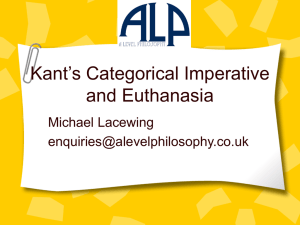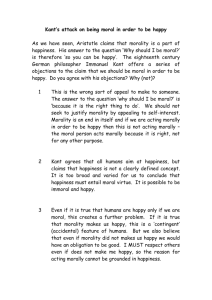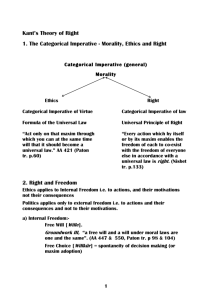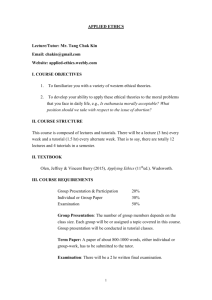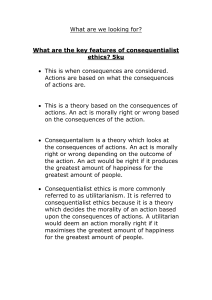KantEuthanasia107.87 KB
advertisement
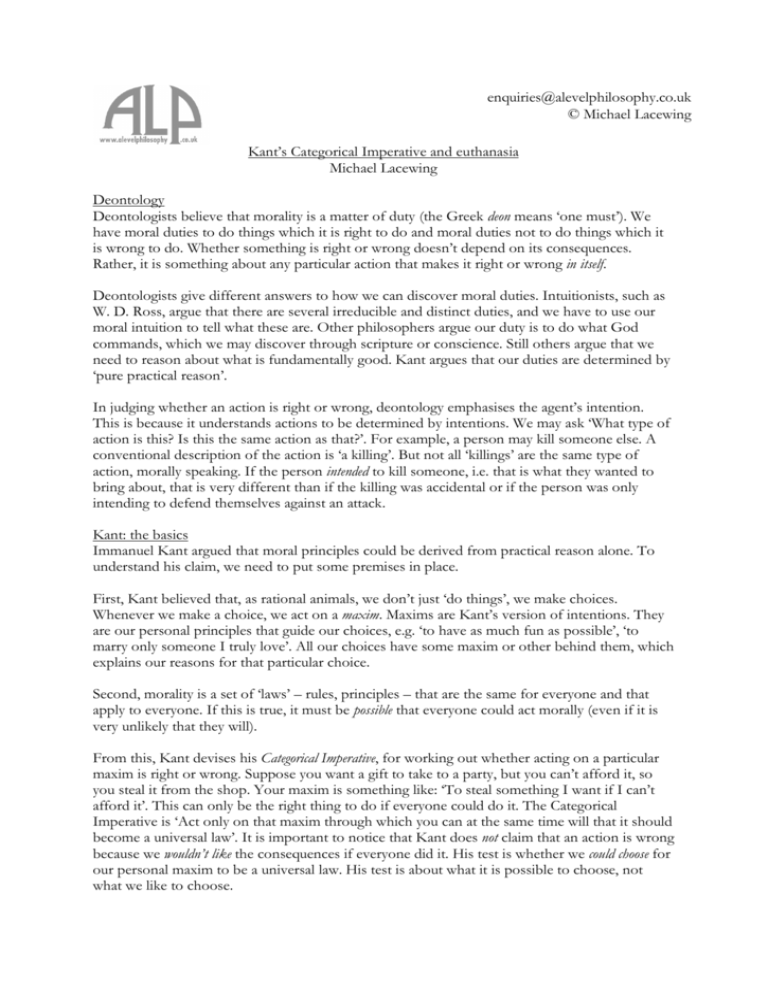
enquiries@alevelphilosophy.co.uk © Michael Lacewing Kant’s Categorical Imperative and euthanasia Michael Lacewing Deontology Deontologists believe that morality is a matter of duty (the Greek deon means ‘one must’). We have moral duties to do things which it is right to do and moral duties not to do things which it is wrong to do. Whether something is right or wrong doesn’t depend on its consequences. Rather, it is something about any particular action that makes it right or wrong in itself. Deontologists give different answers to how we can discover moral duties. Intuitionists, such as W. D. Ross, argue that there are several irreducible and distinct duties, and we have to use our moral intuition to tell what these are. Other philosophers argue our duty is to do what God commands, which we may discover through scripture or conscience. Still others argue that we need to reason about what is fundamentally good. Kant argues that our duties are determined by ‘pure practical reason’. In judging whether an action is right or wrong, deontology emphasises the agent’s intention. This is because it understands actions to be determined by intentions. We may ask ‘What type of action is this? Is this the same action as that?’. For example, a person may kill someone else. A conventional description of the action is ‘a killing’. But not all ‘killings’ are the same type of action, morally speaking. If the person intended to kill someone, i.e. that is what they wanted to bring about, that is very different than if the killing was accidental or if the person was only intending to defend themselves against an attack. Kant: the basics Immanuel Kant argued that moral principles could be derived from practical reason alone. To understand his claim, we need to put some premises in place. First, Kant believed that, as rational animals, we don’t just ‘do things’, we make choices. Whenever we make a choice, we act on a maxim. Maxims are Kant’s version of intentions. They are our personal principles that guide our choices, e.g. ‘to have as much fun as possible’, ‘to marry only someone I truly love’. All our choices have some maxim or other behind them, which explains our reasons for that particular choice. Second, morality is a set of ‘laws’ – rules, principles – that are the same for everyone and that apply to everyone. If this is true, it must be possible that everyone could act morally (even if it is very unlikely that they will). From this, Kant devises his Categorical Imperative, for working out whether acting on a particular maxim is right or wrong. Suppose you want a gift to take to a party, but you can’t afford it, so you steal it from the shop. Your maxim is something like: ‘To steal something I want if I can’t afford it’. This can only be the right thing to do if everyone could do it. The Categorical Imperative is ‘Act only on that maxim through which you can at the same time will that it should become a universal law’. It is important to notice that Kant does not claim that an action is wrong because we wouldn’t like the consequences if everyone did it. His test is whether we could choose for our personal maxim to be a universal law. His test is about what it is possible to choose, not what we like to choose. Here is an example. If we could all just help ourselves to whatever we wanted, the idea of ‘owning’ things would disappear. But if I don’t own something – like the things in my shop – you can’t really ‘steal’ them from me. You can only steal something if it isn’t yours. Stealing assumes that people own things, and people can only own things if they don’t all go around helping themselves whenever they want. So it is logically impossible for everyone to steal things. And so stealing the gift is wrong. Reason and happiness An imperative is just a command. The command is categorical because we can’t take it or leave it. It is not just morally wrong to disobey, Kant thought, it is also irrational. It must be possible for all rational animals to choose to behave rationally. So choosing to behave in a way that it is impossible for everyone to follow is irrational. So we must obey the Categorical Imperative because it is irrational not to. So it is our duty only to act on maxims that can be universalized. Reason both determines what our duties are and gives us the means to discover what our duties are. By why should morality be about behaving rationally? Whatever else we think about morality, it is supposed to guide our actions. It can only do this if we can be motivated by morality. He argues that there are, ultimately, only two sources of motivation: happiness and reason. Morality and happiness Morality can’t be based on happiness, Kant argues, for two reasons. First, what makes people happy differs from person to person. If morality was about happiness, then different people would be motivated to act in different ways. But morality is the same for everyone. A utilitarian would object that morality can be the same for everyone and be about happiness if morality is about creating the greatest happiness. Kant would respond that everyone else’s happiness does not necessarily motivate me, only my own happiness does. And, in fact, utilitarians usually appeal to reason here themselves, saying that caring about other people’s happiness is rational or reasonable. Second, happiness is not always morally good. If someone is made happy by hurting others, this is no reason to say that it is morally good to hurt others. In fact, their happiness is morally bad. So we evaluate happiness by morality. That means the standard of morality must be independent of happiness. Morality and reason Since morality can’t be based on happiness, then it must be based on reason. This is confirmed by the characteristics that morality and rationality share. Morality is universal, the same for everyone; so is reason, says Kant. Morality and rationality are categorical; the demands to be rational and moral don’t stop applying to you even if you don’t care about them. Neither morality nor rationality depend on what we want. Finally, we intuitively think that morality applies to all and only rational beings, not just human beings. In Douglas Adams’ The Hitch-hikers Guide to the Galaxy, Arthur Dent protests to the Vogons, aliens who are going to destroy the Earth, that what they are doing is immoral. Morality doesn’t apply to beings that can’t make rational choices, such as dogs and cats (pets misbehave, they don’t act morally wrongly). Respecting humanity Kant gave an alternative formulation of the Categorical Imperative, known as the Formula of Humanity: ‘Act in such a way that you always treat humanity, whether in your own person or in the person of any other, never simply as a means, but always at the same time as an end’. Kant does not say we cannot use people as a means, but that we can’t use them simply as a means. We rely on other people in many ways as means to achieve our own ends, e.g. people serving me in a shop are a means to getting what I want to buy. What is important, says Kant, is that I also respect their humanity as an end in itself. By ‘humanity’, Kant means our practical rationality, our ability to rationally determine which ends to adopt and pursue. To treat someone’s humanity simply as a means, and not also as an end, is to treat the person in a way that undermines their power of making a rational choice themselves. Coercing someone or lying to them, so not allowing them to make an informed choice, are examples. The ability to make free, rational choices gives human beings dignity. It is also the ground of their absolute value. Everything else only has value because it is adopted by a being with humanity, Kant argues. In one sense, which limits what we may do, to treat humanity as an end is to respect it, which forms the basis of various perfect duties, including not coercing others, not lying, and not stealing. In another, more positive sense, treating humanity as an end means adopting it as an end to be pursued. On this basis, we seek to encourage the ability to make rational and worthwhile choices in ourselves and others. This sense is the basis of various imperfect duties, including helping other people and developing one’s mind. Euthanasia Involuntary euthanasia is euthanasia when the patient does not want to die. Nonvoluntary euthanasia is euthanasia when the patient has not expressed their choice, for example if they are too young to express choices, or they can’t express choices now – e.g. because of being in a coma or mentally impaired through senile dementia – and did not express their choices earlier. Voluntary euthanasia is euthanasia when the patient wants to die and has expressed this choice. Voluntary euthanasia is the most controversial, and so we’ll focus on it. Kant argued that people who commit suicide destroy their rationality in service to something else – pain. And our rationality is more valuable than anything else. So suicide and asking for euthanasia do not show respect for our own rationality; they do not treat it as an end in itself. But this doesn’t deal with cases in which the reason why someone requests euthanasia is because they are about to lose their rational faculties (as in advanced Alzheimer’s disease) or cases in which someone doesn’t have any rational faculties (where children are born without a complete brain). We may agree that rationality is what bestows dignity on human beings, and we must respect people’s dignity. Therefore, a human being who may lose their dignity and their rationality through illness and pain may legitimately request euthanasia. We respect and protect their dignity by helping them die in circumstances of their own choosing. This is one of the most powerful arguments for voluntary euthanasia. But deontologists don’t argue that we should always respect someone’s choice when what they want is morally wrong; sometimes it is morally right to prevent them from doing what they want. So voluntary euthanasia could still be wrong if wanting to die is morally wrong. Active v. passive euthanasia Active euthanasia is when the patient is killed, for instance by a lethal injection. Passive euthanasia is when the patient is allowed to die, for instance by withholding treatment for the disease that then kills them. If voluntary euthanasia is ever morally permissible, is there a moral difference between active and passive euthanasia? An act utilitarian may argue not. In both cases, the person dies. All that matters is that they don’t suffer. However, other theories argue there is. Not killing someone is related to the virtue and duties of justice. Justice requires that we respect people, their choices and rights. Not letting someone die is related to the virtue and duties of charity. Charity requires that we help other people’s lives go well. For example, people all over the world are dying from hunger and disease. It is difficult to argue that because you did not give more to charity you have done something as bad as if you had actually killed them yourself. However, there are some cases in which letting someone die is equivalent to killing them, e.g. when you have a duty to provide food or medicine to someone and you do not. A parent who didn’t give their child food would be guilty of murder. In such a case, both justice and charity require the same thing, and so there is no practical difference between killing and letting someone die. Is there a practical difference in the case of euthanasia? Normally, killing is forbidden by justice as it violates the person’s choice; but in voluntary euthanasia, respecting the person’s choice means killing them. But some deontologists argue that we have a duty not to kill human beings, even if the person who dies requests it. This is one interpretation of the idea of the sanctity of life, that we must respect someone’s right to life even when they want to die. These deontologists may allow passive euthanasia, but not active euthanasia. Many doctors think that the idea of administering lethal injections goes against the idea and duties of practicing medicine. However, in addition to the duty to protect the lives of their patients, doctors also have the duty to do what is best for their patients, including relieving pain. One way of trying to respect both duties at once is to allow the patient to die while doing everything possible to ensure their death is painless. In cases in which passive euthanasia is painful, giving large doses of painkillers is permissible, even if this actually causes them to die sooner. (So to intend to kill someone is always wrong; but the intention here is to relieve pain.) But does the duty to protect life involve the duty to prolong life for as long as possible, even if the quality of life is very poor? If so, then active euthanasia is permitted if doctors must always do what is best for their patient, and death can be what is best. At this point, virtue theory may appeal to virtues such as mercy and compassion to permit euthanasia. Objections to the Categorical Imperative Is the Categorical Imperative a flawed test? First, couldn’t any action be justified, as long as we phrase the maxim cleverly? In stealing the gift, I could claim that my maxim is ‘To steal gifts from large shops and when there are seven letters in my name (Michael)’. Universalizing this maxim, only people with seven letters in their name can steal only gifts and only from large shops. The case would apply so rarely that there would be no general breakdown in the concept of private property. So it would be perfectly possible for this law to apply to everyone. Kant’s response is that his theory is concerned with my actual maxim, not some made-up one. It is not actually part of my choice that my name has seven letters, or perhaps even that it is a gift I steal (some people do, however, have ‘principles’ about only stealing from large shops). If I am honest with myself, I have to admit that it is a question of my taking what I want when I can’t afford it. For Kant’s test to work, we must be honest with ourselves about what our maxims are. Second, Kant’s test delivers some strange results. Say I am a hard-working shop-assistant, who hates the work. One happy Saturday I win the lottery, and I vow ‘never to sell anything to anyone again, but only ever to buy’. This is perhaps eccentric, but it doesn’t seem morally wrong. But it cannot be universalized. If no one ever sold things, how could anyone buy them? It is logically impossible, which makes it wrong according to Kant’s test. So perhaps it is not always wrong to do things which requires other people do something different. Third, how are we to resolve an apparent conflict of duties? Like most deontologists, Kant holds that a real conflict of duties can never occur. If there appears to be a conflict, we have misunderstood what at least one duty requires of us. He argued that it takes considerable judgment to know how to apply the Categorical Imperative in real life. Choices in life are difficult and unclear, a moral theory should not pretend to provide all the answers. A moral life calls for insight and judgment, not knowledge of some philosophical theory. Fourth, utilitarians object that deontology is irrational. If it is my duty not to murder, for instance, this must be because there is something bad or wrong about murder. But then if murder is bad, surely we should try to ensure that there are as few murders as possible. If I know that unless I kill someone deliberately, many people will die, how can I justify not killing them by appealing to duty? Surely it is only my duty not to kill because death is bad. So I should prevent more deaths. To insist that I don’t do anything ‘wrong’ seems a perverse obsession with ‘keeping my hands clean’. Utilitarianism understands all practical reasoning – reasoning about what to do – as means-end reasoning: it is rational to do whatever brings about a good end. Deontology rejects this view. First, it may claim that we do not have a duty to maximize what is good. The utilitarian thinks it is just obvious that if something is good, more of it is better, and we ought to do what is better. There is no further argument to be given. The deontologist disagrees. Second, deontology offers an alternative theory of practical reasoning, which rejects the means-end reasoning of utilitarianism.
